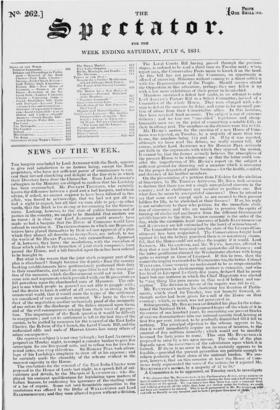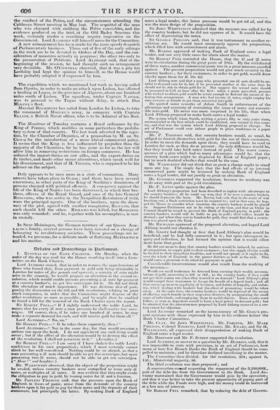NEWS OF THE WEEK.
THE bargain concluded by Lord ALTHORP with the Bank, appears to give real satisfaction to no human being, except the Bank
proprietors, who have not sufficient power of countenance to cull-
veal their inward chuckling and delight at the fine Style in which their Directors have done the Chancellor. Even Lord .Arernotte*s colleagues in the Ministry are obliged to confess that his Lordship
has been overreached. Mr. POULETT Tnoelsoer, who certainly knows the diftbrence between a good and a bad bargain, and whose
advice, if risked, we cannot suppose to have been followed in this
affair, was forced to aeknowedge, that we had not got all we had a right to expect, but all that we were able to get,--in other
words, that the Bank is too stveng or too cunning for the Govern- ment. Looking, however, to the state of public business and of parties in the country, we ought to be thankful that matters are no worse : it is clear that Lord ALTHORP could scarcele have made so bad a bargain that the House Of Commons would have refused to sanction it. The circumstances in which our Represen- tatives have placed themselves by their solemn approval of a plan which they almost all describe as inexpedient, are indeed, to use the words of Sir IIEsay PARNELL, very extraordinary. Approved of it, however, they have : the resolutionsewith the exception of those which relate to the formation of joint stock companies, letve possed the House, and a bill founded upon them has been ordered to be beonght in. But what is the reason that the joint stick company pint of the plan is abandoned? Simply because the deputies from the country banking establishments have pertinaciously performed their duty to their constituents, and raised an opposition to not the worst por- tion of the measure, which the Government could not resist. The same arts and arguments which prevailed with our Representatives 101 powerless upon the clearheaded men of Mammon. The sub- jt:ct is one which people in general are riot able to grapple with ; and the desire to have it settled at all events, is so strong in the commercial world, that it would seem the terms of' the settlement -are considered of very secondary moment. We have in the con- duct of the negotiation another melancholy proof of the incapacity of our rulers for the discharge of' the duties imposed upon them, and of the evil consequenees arising from their want of prepara- tion. The importance of the Bank question it would be difficult to exaggerate; and yet its settlement is left to the last days of the session, to he jostled by measures for the renewal of the East India ,Charter, the Reform of tlie Church, the Local Courts Bill, and the unfinished odds and ends of Heaven knows how many others of _minor consequence. On SO grave a subject it is not easy to laugh ; but Lord A LTHORP'S proposal on Monday night, to compel a country banker to give five -sovereigns for one five-pound note, and to refuse ten for two five- peund notes, was rely ridieuleus. Sir ROBERT PEEL took advan- tage of his Lordship's simplicity to show off at his expense ; and be certainly made the absurdity of the scheme evident to the meanest capacity in the House. . The resolutions for the renewal of the East India Charter were proposed in the House bf Lords last night, in a speech full of cal- culations and details, by the Marquis of LAersnowNE; who dis- played his eminent qualifications fin legislating upon matters of Indian finance, by confessing his ignorance of the sterling value of a lac of rupees. Some not very formidable opposition to the • resolutions was offered by the Duke of WELLINGTON and Lord ELLENHOROUGH; and they were allowed to pass without a division. 613 The Local Courts Bill having passed through the previous 613 stages, is ordered to be read a third time on Tuesday next ; when, report says, the Conservative Peers mean to knock it on the head.
course, neither Lord ALTHORP 11nr Sir Romer Pram seriously put faith in the arguments with NvItirlt they opposed the motion. It cannot be, that the former actually believes the atmosphere of the present House to be wholesome; or that the latter could con- sider the imperfection of Mr. HUME'S report on the subject a sufficient ground tbr throwing out a measure which is necessary for the proper despatch of public business—for the health, conifori, and decency of his brother members.
On the presentation of' a petition from Fifeshire for the abolition .
of Sinecures, by Mr. TIIONIAS ATTWOOD, Mr. Rice took occasion to declare that there was not a single unregulated sinecure in the country ; and he challenged any member to produce one. 13tit what does he mean by unregulated sinecures? Does he intend to say that none exist except such as are secured to their present holders for life, to be abolished at their decease? If so; his reply is not satighotory to those who petition for the immediate abolf- tion of sinecures; and who are unable to perceive the equity of TOPIcS OF THE Day— As this bill has not passed the Commons, an opportunity is Reasons for a Further Modification offered of annoy big Ministers without coming to a direct collision with the Representatives of the People. Should success attend the Opposition in this adventure, perhaps they may follow it up with a few more exhibitions of their power to do mischief. Ministers sustained a defeat last night, in an attempt to refer Lord As!! LEV'S Factory Bill to a Select Conunittee, ins'ead of a Committoe of the whole House. They were charged siih a de- sign to &nett the measure by delay, and came in for no small por- tion of abuse from their Conservative allies. In this instance.. they have received hard measure. The subjept is one of extreme delicacy; and we fear our " one-sided" legislators and cheap- humanity-men are on the point of commilting a notable folly, in their headlong zeal. The numbers on the division were 1 64 to 14 1. - Mr. Iluersfs motion for the erection of a new 110Utie of Com- mons was rejected, on Tuesday, by a majority of more than two to one, the numbers being 1 5 4 and 70. Ithy it was rejected, although we have read the debate, we really cannot tell. Of :turning off clerks and nreebanics from the different Goverement establishments by the score, because economy is the order of the day, while the enormoue legal sineeures ofLords EeLesmonoutat and RANFURLY are left untouched by the hand of retrenchmeet.- The Committee for inquiring into the state of the Liverpool Cini- stituency has been reappointed. The Conservatives fought hard against it ; but the bribery practised there is so notoriously shame- . ful, that the House could not refuse the inquiry if it would. Lord SA:elm:se Mr. GL ADSTONE, and Mr. WYNN-, however, aill2cted to deny that a case had been made out against the old freeinea ; and the latter gentleman charged the Westminster electors with being quite as corrupt as those of Liverpool. If this be true, then the sooner the inquiry is extended to Westminster too, the better. Colonel WiLlea.ms, whose veracity we understand to be as unquestionable as his experience in electioneering matters is extensive, and who . has lived in Liverpool fur thirty-five years, deelered that he never knew but one instance in -which the Chief Magistrate was elected • by "any thing like pure means in that nest of bribery and cor- ruption.- The division in favour of the inquiry was 166 to 82.
Mr. TENNYSON'S motion for shortening the duration of Parlia- ments, which stood for Tuesday, was not brought forward, il- though notice had been given for a call of the House on that evening; which, as usual, was not persevered in.
Subsequently., Mr. BUCKI NGH AM detailed his plan for the reduc- tion of the National Debt. He proposed to pay off the whole of it in the course of one hundred years, by converting our present Stocks of various denominations into one national annuity fund, bearing at lirst five per cent, interest, to be gradually diminished till it fell to nothing. The principal objection to the scheme appears to be, that it weuld .immediately require an increase of taxation, to the amount of five millions annually; which would not be sensibly lessened for forty years to Come. This sum Mr. BUCKINGHAM proposed to raise by a tax upon income. The value of the plan depends upon the correctness of the calculations upon which it is formed. If there is no error in th i ese, t certainly. appears to be feasible,—provided the present generation are patriotic enough to relieve posterity of their share of the national burden. We sus- pect, however, that on this occasion at least the House of (*om- inous truly represented the voice of the nation ; for it rejected Mr. BUCKINGHAM'S motion, by a majority of 57 to 38.* A Committee is to be appointed, on Tuesday next, to investigate We observe that Mr. Btreatrcauftm, in his Parliamfatary Rerior, seems anxious to have it understowl that the Ilonse was attentive during the tutor and a half occupied by the delivery of his speech. We can inturm hitn that there was such a constant buzz a ml talking gig on all the while, that, bom err station under the Gallery, we could, nut hear one sentence he uttered. This is no dirparagement to Mr. Btrortrrotr.Krftait,„. ran talk as fluently as any member, and to betu r purpose than most of,etlik • the conduct of the Police, and the circumstances attending the Calthorpe Street meeting in May last. The acquittal of the man who was charged with stabbing the Police constables, and the evidence produced on the trial, at the Old Bailey Sessions this -week, certainly render a searching inquiry imperative on the Government. Lord A I.TH oar will himself move for the Committee.
A new arrangement has been made for the more speedy despatch of Parliamentary business. Three out of five of the early sittings in the week are to be devoted to Orders of the Day, and the con- sideration of measures actually in progress; the other two only to the presentation of Petitions. Lord ALTHORP said, that at the beginning of the session, he had thought such an arrangement -very desirable. Mr. O'CONNELL observed, that it was a pity his Lordship had kept the opinion to himself, as the House would have probably adopted it if expressed by him.

















